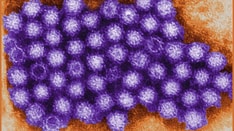For children exposed to acid-suppressant medications, such as proton pump inhibitors and histamine 2 receptor antagonists, during their first year of life, the risk for recurrent wheeze at age 3 is significantly elevated, researchers warn.
"We are potentially overusing this treatment," said Lacey Robinson, MD, from Massachusetts General Hospital in Boston.
"I wasn't surprised by the association with higher wheeze that we found," she told Medscape Medical News. However, the "high use of acid suppressants" — at 18% — was a surprise.
And acid suppressants were used in infants for a much longer period than expected. "We're not talking one or two doses; there was average duration of 3 to 4 months of use," Robinson reported. "And there are no data showing that's a good idea."
For their study, Robinson and her colleagues followed infants who had been hospitalized for bronchiolitis before their first birthday and assessed recurrent wheeze at 3 years. Results were to be presented at the since-cancelled American Academy of Allergy, Asthma and Immunology 2020 Meeting.
Of the 879 study participants, 159 (18%) were exposed to acid-suppressant medication during their first year of life.
Recurrent wheeze at age 3 occurred more often in infants exposed to acid suppressants than in those who were not (43% vs 29%; unadjusted hazard ratio, 1.63; 95% confidence interval [CI], 1.24 - 2.14).
"Even after adjustments, that number remained stable," Robinson said. In fact, the hazard ratio was 1.54 (95% CI, 1.15 - 2.07) after adjustment for 10 confounders: sex, race and ethnicity, median household income, insurance, gestational age, mode of delivery, bronchiolitis severity, respiratory syncytial virus infection, maternal atopy, and maternal use of acid suppressants during pregnancy.
A 2018 study of 792,130 infants showed that "allergic disease was significantly increased in those who had received acid suppressants or antibiotics during the first 6 months of life."
Both these medications affect the microbiome, so it makes sense that they would affect allergies, Aaron Carroll, MD, digital media editor of JAMA Pediatrics, said when discussing that study during a podcast, as reported by Medscape Medical News.
We don't have enough data to say stop using them, and "often times the medication is given empirically on vague symptoms," Robinson explained.
18% Might Not Be High
"If only 18% of a cohort of infants hospitalized with severe respiratory issues have had some exposure to an acid-suppressing medication, that's already an interesting fact that suggests that pediatric clinicians are being judicious," said Jenifer Lightdale, MD, from UMass Memorial Children's Medical Center in Worcester, Massachusetts.
The 2013 guidelines on gastroesophageal reflux from the American Academy of Pediatric (AAP) "are starting to feel old," said Lightdale, who was involved in their development.
The importance of assessment for gastroesophageal reflux disease (GERD) is stressed in 2019 guidelines issued jointly by the North American Society for Pediatric Gastroenterology, Hepatology, and Nutrition and the European Society for Pediatric Gastroenterology, Hepatology, and Nutrition.
Those guidelines state that, "based on expert opinion, the working group suggests not to use H2RAs or PPIs in patients with extraesophageal symptoms (i.e., cough, wheezing, asthma), except in the presence of typical GERD symptoms and/or diagnostic testing suggestive of GERD."
In the past, this "special" population of children would have likely had exposure to acid-suppressant medications about 50% of the time. "It's encouraging that clinicians are heeding this message," Lightdale told Medscape Medical News.
"It's certainly nice to have a well-done, prospective cohort study, like this one appears to be, to support the conclusions that the guidelines already promulgate," she added.
In preterm infants, gastroesophageal reflux is a normal developmental condition, is usually asymptomatic, and typically resolves as the preterm infant matures, said Eric Eichenwald, MD, professor of pediatrics at the Perelman School of Medicine, University of Pennsylvania, in Philadelphia, who led the committee that wrote an AAP 2018 clinical report.
"Diagnosis and treatment are almost always unnecessary," he told Medscape Medical News when that report was released.
It's important to take a pause when prescribing reflux medications for infants, said Robinson. "These medications do provide benefit, but we need to look more closely at the risk–benefit so that doctors and parents can decide the right course of action in future."
The MARC-43 cohort, which is currently enrolling patients, will be looking at the effect acid suppressants have on healthy children, particularly in the microbiome.
"That will be another piece of the puzzle to help us really know for sure and understand the association a little better," Robinson said.
"If we know it is changing the microbiome, it opens the door to understand what the risk of the medication could be and when it should be used. We really need to understand the association better to understand why it's harmful," she explained.
A better understanding could also lead to finding solutions. "Is that reversible or temporary? Knowing that would also help guide decisions," she added.
American Academy of Allergy, Asthma and Immunology (AAAAI) 2020 Meeting: Abstract L1.
Follow Medscape on Facebook, Twitter, Instagram, and YouTube
Medscape Medical News © 2020
Cite this: Acid Suppressants Worsen Respiratory Symptoms in Infants - Medscape - Mar 26, 2020.









Comments